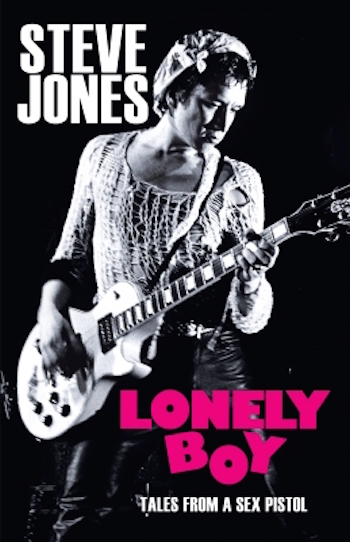Music Interview: Steve Jones of the Sex Pistols — A “Lonely Boy”
Having long gotten “the short end of the stick,” Sex Pistols founding member Steve Jones decided to write his autobiography.
By Blake Maddux

Although guitarist Steve Jones was a founding member of the Sex Pistols, he is not one of the band members who is featured on T-shirts.
That somewhat dubious honor goes to lead singer John Lydon, better known as Johnny Rotten, and bassist John Simon Ritchie, known to punk rock fans and moviegoers as Sid Vicious.
Having long gotten—as he put it when I recently spoke to him by phone—“the short end of the stick,” Jones decided to write (with Ben Thompson) Lonely Boy: Tales from a Sex Pistol, an autobiography published by Boston’s Da Capo Press.
The subtitle refers the band that made Jones famous and the book’s three sections are called “Before,” “During,” and “After” in reference to the periods of his life during which he was and was not a member of the Sex Pistols. However, Lonely Boy is primarily a book about Steve Jones and only secondarily about the equally short-lived and influential group of which he was a key member.
Over the course of 300 pages, the reader learns of Jones’s unenviable childhood, his rebellious teenage years, and his post-Sex Pistols life in which he found himself stealing Beatles records and promotional photos of Heart to sell for drug money. While one could hardly say that it has a Hollywood ending, Lonely Boy is ultimately a tale of triumph, as “Jonesy” confronts his addictions, comes to terms with those who wronged him, and lands his first steady job as the host of his own radio show, “Jonesy’s Jukebox.”
Beloved former Boston Red Sox catcher Carlton Fisk once said, “It’s not what you achieve, it’s what you overcome. That’s what defines your career.”
Replace “career” with “life” and you have a suitable prefatory quote for Lonely Boy. By way of warning, I’d like to mention that Jones does not write until page 294 what is crystal clear by page 30: “I don’t believe in sugar-coating things.” Also, it would have been helpful to us Americans if Jones would have included an appendix of British slang, sort of like Anthony Burgess did in A Clockwork Orange.
What follows is from the phone interview that I did with Steve Jones when he was in New York City for a series of book signings.
Arts Fuse: What made you decide to tell the story of your life?
Steve Jones: I thought about it a long time ago, 10-15 years ago. I never got ‘round to it. Nothing seemed to align. And I had another thought about it about a year ago, and everything seemed to fall into place: a couple of publishers, I liked the ghostwriter [Ben Thompson], it was a good time.
I’m actually glad I didn’t do it 15 years ago, ‘cause I’m a bit more aware of myself 15 years later, you know? So it just seemed like a good time to do it. There’s no rhyme or reason. There was no agenda to do it to line up with the 40th year of punk or any of that stuff. It just seemed right, and I wanted to get my two cents out there. No one really hears my story. It’s always John [Lydon], you know?
AF: Did you have any reservations about writing such a highly personal and detailed account?
Jones: No. I mean some of it was weird. Some of the teenage, growing up, confused kid was a bit weird, but I thought, you know, it’s OK. Some people might react different to it, get put off by it, but I don’t care. It’s all good.
AF: You did not learn to read and write properly until you were in your 30s. Given that, how does it feel to have written more books than most people do in their lives?
Jones: It feels good. I don’t consider myself an author, though. It feels weird when people say, “Oh, you’re an author now.” It just seems a bit odd. You know what I mean? I’m not really an author. I just told a story.
(Go to the 4:47 mark to witness Steve Jones in all his “Fabio phase” glory during this 1988 performance with Iggy Pop on Late Night With David Letterman)
AF: “Purple Haze” is one of the first songs that you mention as having a profound effect on you. Did you ever aspire to play guitar like Jimi Hendrix?
Jones: It’s funny, I had no interest in being like Jimi Hendrix at all. I wanted to be more like Ronnie Wood [Faces, The Rolling Stones] or Brian May [Queen] or Johnny Thunders [New York Dolls, The Heartbreakers] or James Williamson [The Stooges]. My main man is Mick Ronson. That’s my main guitar player. That’s who I really aspired to, you know, Ziggy Stardust & the Spiders from Mars. That was the ultimate to me.
AF: I don’t want to give away too much, but did you manage to abscond with any of Ronson’s equipment from David Bowie’s Hammersmith Odeon gigs in 1973?
Jones: I got the bass player’s equipment and the drummer’s cymbals, but I left Mick untouched. I spared him.
AF: Referring to Sid Vicious, you wonder in the book, “If only we’d called him ‘Sid Kind’….” What would have been a better name for John Lydon than Johnny Rotten?
Jones: Johnny Sweet. (laughs)
AF: Do you think that they felt the need to live up to those nicknames, thereby dooming the Sex Pistols?
Jones: No…on a funny note I guess, yeah. But it was doomed regardless, you know? It didn’t matter what names we would have had. It was meant to be a short-lived thing. Which is, in a way, it’s OK. It’s definitely given us the legs that when we did break up, we’re still talking about it 40 years later, you know?
AF: Several sources state, without citing any definitive evidence, that your riff for “Holidays in the Sun” was based on—or stolen from—“In the City” by The Jam. Was it, or did you conceive of the riff independently?
Jones: Um…I mean, there’s similarities. I didn’t feel like I was ripping it off of them. I mean, it’s only that little bit. There’s obviously similarities, yeah, but I don’t think I heard that and like, “Oh, I’m gonna steal it.” I don’t think that’s what was going on. I mean, if it was that blatant, I’m sure Paul Weller would’ve wanted some money from it or a lawsuit.
AF: Did anything at the time seem special about the gig in Manchester at which—among others—future members of The Smiths, The Fall, The Cult, and Joy Division were in attendance?
Jones: No, it just seemed like another show up north. It was a bit rowdy, like they all was back then because people weren’t converted. It wasn’t like they were full of fans. It was full of people who had never seen us, and some of the reactions from people who had never seen us was to get all aggro at us and throw shit at us. It just seemed like another gig like that to me. I had no idea who was in the audience.
AF: Do you remember when you learned that those people were there?
Jones: Oh yeah, I mean later on. Especially from the movies, you know? Control and 24-Hour Party People. But prior to that, I kind of heard that Morrissey was there. But whatever. I mean, it’s not the biggest deal.
AF: Maybe not to you, but the impression it made on the members of Joy Division, which bassist Peter Hook wrote about in his book Unknown Pleasures, is enough in itself to qualify it as having singlehandedly had a major influence on late-70s/early 80s popular music.
Jones: Oh, sure. I mean, if they started bands because they saw us, then that’s a good credit, you know?
AF: Now that Journey is in the Rock and Roll Hall of Fame, a lot of people on social media feel to need to point out how much they dislike them or find the selection unjustified. You, however, write that you like them and other late-70s arena-rock groups.
Jones: I mean, I understand where people are coming from. People think they’re cheesy. And there’s a mystique about them being, like, uncool. And I get it, but I just think that they’re great songs, and they’re played really well. The singer from Boston’s got a fantastic voice. Obviously it’s not punk, but I appreciate it for what it is, and they’re really catchy songs. You know, if you like something, you like it. You can’t shut it down just because people are gonna think you’re an idiot.
I actually did a duet with [Journey guitarist] Neal Schon. We did a version of “Lights,” the Journey song, where I’m singing and he’s playing guitar and there was a girl with a cello. It’s pretty good.

Steve Jones. Photo: Davis Factor.
AF: (Steve Jones on Late Night with Seth Meyers the night after I interviewed him) Have you ever—as an adult—been the victim of any of the transgressions of the law that you committed when you were a “one-teenager West London crime wave”?
Jones: The thing is, when you’re that much of a thief…I never leave any shit lying around anywhere, because I’m always thinking there’s gonna be a Steve Jones sneaking around. And some people don’t even get that concept, but I’m very aware. I never leave my guitar anywhere, you know?
AF: Do you have any advice for those who have suffered the neglect, abuse, low self-esteem, and addictions that you have?
Jones: Yeah. My best advice is don’t hold it in. Don’t carry it around with you. Talk to someone, even if it’s just one person. It takes a lot of weight off your shoulders once that’s out. You know, it’s a horrible process, especially when it happens when you’re young. It kind of sticks, you know?
AF: Who are some of the people who you would like to have as guests on Jonesy’s Jukebox?
Jones: Oh man, I mean there’s a big list. A lot of them are dead. I don’t know. I would have loved to have had Bowie on. I tried to get Bryan Ferry. His son was trying to get him on the show, but he played that night and his son said that he was too exhausted to come on in the daytime. That would have been good. I’d like to get Brian Eno. That would be good. I like oddballs. I’m not really a mainstream guy, you know?
AF: Is there any chance that you will record a new album under your own name or with a band?
Jones: Yeah, I think so. I think I’m going to work on that. I’ve got a load of tunes. I’ve got lots more lyrics. But I’m in the mood to do another record. It’s been a while since I’ve done one, but just for shits and giggles. You don’t make any money, and it definitely ain’t about making money. It’s just an artistic outlet, really. But I’m in the mood, so hopefully sooner than later.
Blake Maddux is a freelance journalist who also contributes to The Somerville Times, DigBoston, Lynn Happens, and various Wicked Local publications on the North Shore. In 2013, he received an MLA from Harvard Extension School, which awarded him the Dean’s Prize for Outstanding Thesis in Journalism. A native Ohioan, he moved to Boston in 2002 and currently lives with his wife in Salem, Massachusetts.
Tagged: Da Capo Press, Jonesy’s Jukebox, Lonely Boy: Tales from a Sex Pistol
